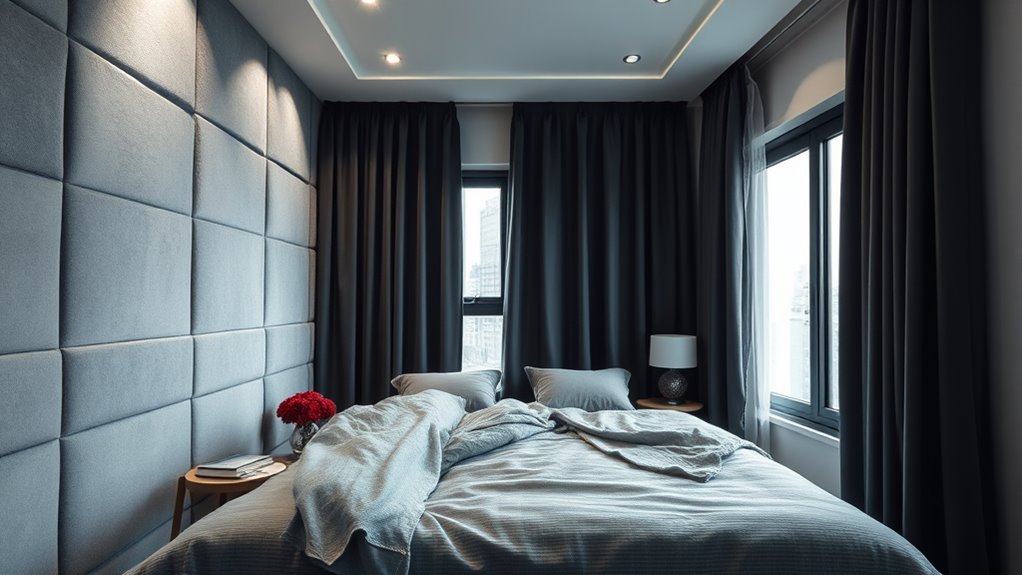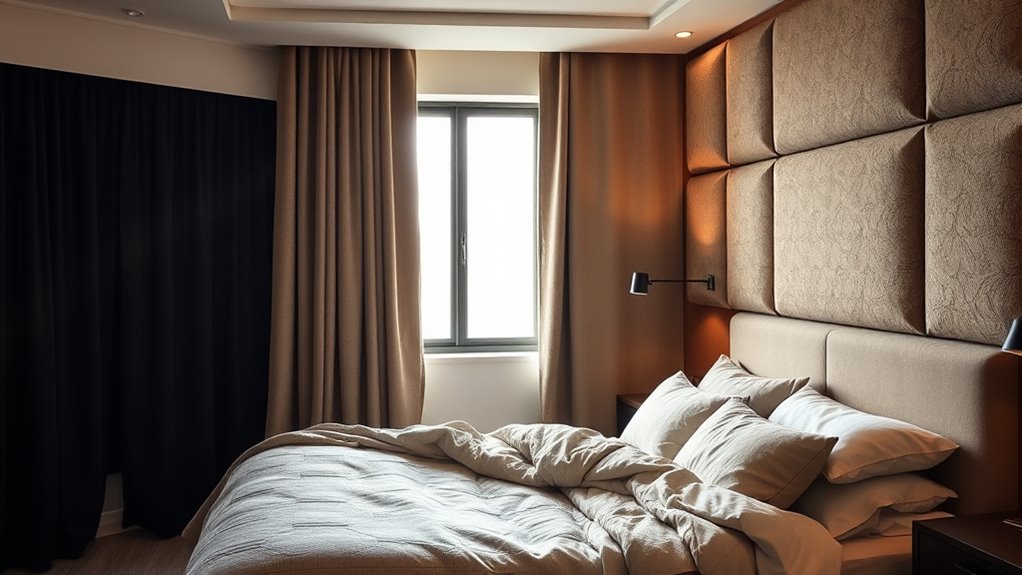To reduce noise disturbances in your bedroom, start by adding acoustic panels to walls facing noisy areas. Seal any gaps around windows with weatherstripping or install double-glazed windows for better insulation. Don’t forget to improve door seals with weatherstripping or door sweeps. Combining these layered strategies will make your space markedly quieter. Want to discover more effective tips? Keep exploring how proper placement and additional tricks can further enhance your peace and quiet.
Key Takeaways
- Install acoustic panels on bedroom walls facing noisy areas to absorb sound and reduce echo.
- Seal windows with weatherstripping or double-glazing to block external noise infiltration.
- Use door sweeps and weatherstripping around door frames to minimize sound leaks.
- Combine acoustic panels with window sealing for a layered noise reduction approach.
- Choose discreet, fabric-covered panels to maintain bedroom aesthetics while enhancing soundproofing.

If noise disturbances are disrupting your sleep or daily activities, soundproofing your bedroom can make a vital difference. One of the most effective ways to achieve this is by installing acoustic panels. These panels absorb sound waves, reducing echo and muffling external noises. Choose panels made from dense materials like foam or mineral wool, and position them strategically on walls that face noisy streets or neighboring units. Remember, the goal is to break up sound reflections and prevent noise from bouncing around your room, creating a calmer environment. Acoustic panels are discreet and can be painted or covered with fabric to match your decor, making them a practical yet aesthetic solution.
Another essential step is ensuring your windows are properly sealed. Windows are often the biggest vulnerabilities when it comes to noise infiltration. To enhance soundproofing, start by applying window sealing strips or weatherstripping around the edges. These strips fill gaps that allow sound to pass through, making a noticeable difference in noise levels. For added insulation, consider installing double-glazed or even triple-glazed windows, which contain multiple layers of glass separated by air pockets. These layers markedly dampen external sounds, especially traffic or loud neighbors. When sealing windows, don’t forget to check for any cracks or gaps in the window frame and fill them with appropriate filler or sealant. This prevents noise from sneaking in through tiny openings that might otherwise go unnoticed.
Combining acoustic panels with effective window sealing creates a layered approach that maximizes noise reduction. While acoustic panels help absorb internal sounds and echoes, sealed windows block external noise sources. It’s a balanced strategy that tackles noise from multiple angles. Be mindful of the placement; for instance, install acoustic panels on the wall facing the loud street or neighbors, and focus on sealing windows that face the noise source. Keep in mind that improving the door seals can also contribute markedly, so consider weatherstripping or installing door sweeps as part of your soundproofing plan. Additionally, integrating advanced automation can help monitor and control noise levels for a more comfortable environment.
Frequently Asked Questions
Can Soundproofing Harm Indoor Air Quality?
Soundproofing your bedroom won’t harm indoor air quality if you choose proper materials and guarantee good ventilation. Some soundproofing products, like dense foams or sealants, can affect air quality concerns if they emit volatile organic compounds (VOCs). To avoid this, select low-VOC materials and maintain adequate ventilation, which helps mitigate any negative ventilation impact and keeps your air fresh and healthy while reducing noise disturbances.
How Much Does Professional Soundproofing Typically Cost?
Professional soundproofing costs typically range from $1,000 to $3,000, depending on your room size and the materials used. You should consider your budget considerations carefully, as high-quality solutions may be more expensive but offer better noise reduction. Get cost estimates from several specialists to compare prices and services. This way, you can find a balance between effective soundproofing and affordability, ensuring your bedroom stays peaceful without overspending.
Will Soundproofing Affect Room Ventilation?
Worried soundproofing will turn your room into a stuffy cave? Rest assured, noise insulation can impact airflow, but clever installation minimizes this. You might notice slight changes in ventilation, but with modern techniques, you’ll still enjoy fresh air while blocking out noise. Think of it as a quiet fortress with just enough airflow—no need to sacrifice comfort for peace and quiet.
Are There Eco-Friendly Soundproofing Options?
Yes, eco-friendly soundproofing options are available. You can use recycled materials like reclaimed wood or cork panels, which effectively absorb sound. Natural insulation options, such as sheep’s wool or cellulose made from recycled paper, also provide excellent soundproofing while being environmentally friendly. These choices help you reduce noise disturbances without compromising your commitment to sustainability, making your bedroom both peaceful and eco-conscious.
How Long Does Soundproofing Installation Usually Take?
The soundproofing installation typically takes between one to three days, depending on the scope and the soundproofing materials you choose. If you opt for basic solutions like sealing gaps or adding insulation, it may only take a day. For more extensive soundproofing, such as installing soundproof drywall or panels, plan for a few days. The installation timeline varies based on the complexity and the quality of the materials used.
Conclusion
By taking these soundproofing steps, you’re turning your bedroom into a fortress of tranquility amidst a noisy world. Think of it as building a barrier that soaks up unwanted noise like a sponge, letting peaceful silence flow in. With a little effort, you’ll create a sanctuary where restful sleep reigns supreme, and noise becomes just a distant echo. Your bedroom will become your personal oasis—calm, quiet, and perfectly quieted.







